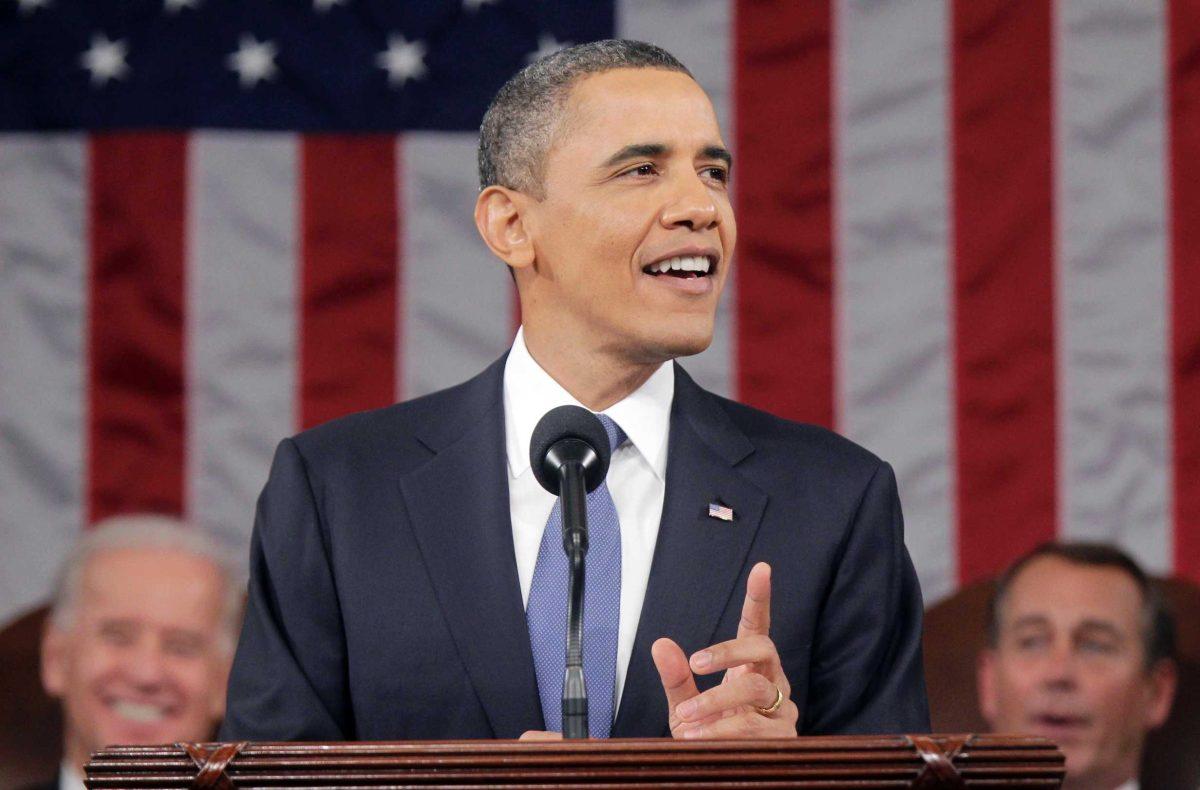President Barack Obama pleaded for political unity to face the nation’s continued economic crisis in his State of the Union speech Tuesday night.
“We will move forward together, or not at all — for the challenges we face are bigger than party and bigger than politics,” Obama said.
Obama mentioned the shooting in Tucson, Ariz., that killed six and left Rep. Gabrielle Giffords, D-Ariz., in critical condition.
“Amid all the noise and passions and rancor of our public debate, Tucson reminded us that no matter who we are or where we come from, each of us is a part of something greater — something more consequential than party or political preference,” he said.
The speech is Obama’s first in front of a Congress with significantly more Republicans than Democrats. The party took control of the House of Representatives and slimmed the Democratic majority in the Senate in the November elections.
Obama’s speech focused almost entirely on the economy.
“The economy is growing again,” he said. “But we have never measured progress by yardsticks alone. We measure progress by the success of our people.”
Video: What would you ask Obama
While the president was quick to point out encouraging economic indicators — including a recovering stock market and recovering corporate profits — he made clear the economic crisis is not finished.
“The steps we’ve taken over the last two years may have broken the back of this recession — but to win the future, we’ll need to take on challenges that have been decades in the making,” Obama cautioned.
Obama focused largely on making the country more competitive against international rivalry.
“At stake is whether new jobs and industries take root in this country, or somewhere else,” he said.
The president argued making the country competitive in the global economy requires investment in new technologies, especially “green” energy.
“This is our generation’s Sputnik moment,” he said, referring to the Soviet Union’s early lead over America in the space race. “In a few weeks, I will be sending a budget to Congress that helps us meet that goal.”
Channeling President John F. Kennedy, Obama called for the country to be 80 percent reliable on clean energy by 2035.
To do that, he called for the country to “become the first country to have 1 million electric vehicles on the road by 2015.” He also urged Congress to “eliminate the billions in taxpayer dollars we currently give to oil companies.”
Obama argued that education reform is essential to rebuilding the economy.
“If we want to win the future — if we want innovation to produce jobs in America and not overseas — then we also have to win the race to educate our kids,” he said.
Obama touted several of his administration’s education programs, especially his Race to the Top program. He also called on parents to take more personal responsibility for their students.
Obama paid special attention to higher education.
“To compete, higher education must be within reach of every American,” he said.
He reiterated his previous commitment to make the U.S. the country with the highest proportion of college graduates.
In terms of actual higher education policy, Obama called for Congress to make permanent the administration’s $10,000 tuition tax credit.
He also asked Congress to consider removing impediments for children of undocumented immigrants to obtain higher education.
The “DREAM Act,” which would have removed those impediments, failed in the last weeks of the last Congress.
The president also reiterated his commitments to revamp the country’s infrastructure — providing high-speed rail access to 80 percent of Americans — and to double the country’s exports by 2014.
He also acknowledged the effort by congressional Republicans to repeal the controversial health care reform he signed last year.
“Instead of refighting the battles of the last two years, let’s fix what needs fixing and move forward,” he said.
Obama focused on reducing the country’s ballooning deficit, announcing a five-year spending freeze for all non-defense, non-discretionary spending.
In the Republican response to the speech, Rep. Paul Ryan, R-Wis., and Chairman of the House Budget Committee, applauded Obama for focusing on the economy, but criticized him and the Democratic Party for increasing spending in the stimulus bill and health care law.
“We believe the days of business-as-usual must end,” he said. “Borrowing has to end. Spending cuts have to come first.”
Blog: State of the Union sets Obama’s policy agenda
Republicans have proposed deep federal budget cuts, saying Obama’s proposed spending freeze is insufficient, according to news reports.
Images from the Congressional crowd contrasted starkly with previous States of the Union, as senators and representatives chose to sit together.
In previous speeches, the crowd — and the applause — was starkly divided along partisan lines.
Bob Mann, University political communication professor who teaches political rhetoric, said Obama’s speech was skillfully vague.
“It was a well-done speech thematically,” he said. “He obviously didn’t want to get into the weeds on specific policy issues.”
____
Contact Matthew Albright at [email protected]
Obama puts focus on economy during 2011 State of the Union address
January 26, 2011
President Barack Obama delivers his State of the Union address on Capitol Hill in Washington on Tuesday. The speech highlighted the economy as a main focus.








